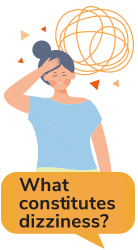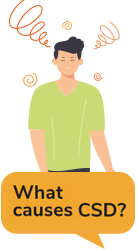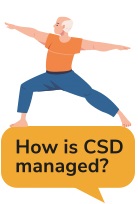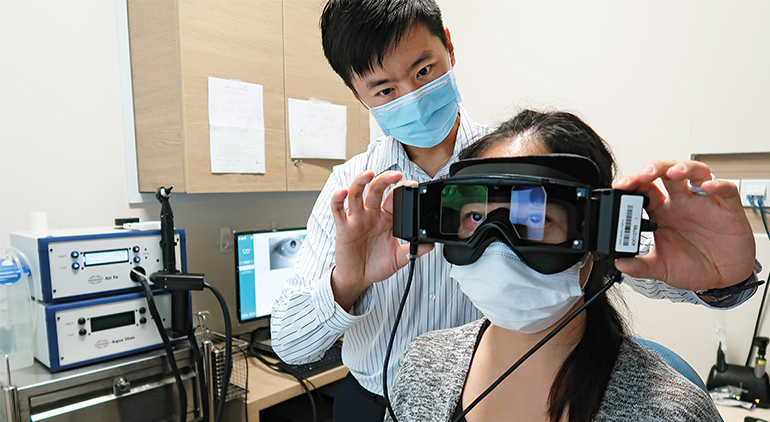Experiencing bouts of lightheadedness, and unsteadiness but with no apparent cause? Here are some objective facts on chronic subjective dizziness (CSD).

Some individuals have been found to have CSD or the perception of dizziness — mostly an internal sense of space and motion discomfort that lasts longer than three months. Changi General Hospital (CGH) Senior Audiologist Dr Kenneth Chua gets our heads around this condition.

Dizziness is an umbrella term that can include many different types of sensations such as light-headedness, faintness, wooziness, being unsteady or off-balance, CSD and vertigo. Not to be confused with CSD, vertigo refers specifically to a particular “spinning of your surroundings” sensation, where one feels that things are moving around you even though the objects are stationary. CSD is characterised by a feeling of floating or like their heads are “swimming”.

CSD is the result of a combination of psychological and physical factors. The exact causes of CSD are currently unknown. In some cases, the medical issues causing the dizziness are not identifiable, but patients tend to have some history of underlying vestibular (inner ear) issues — such as dizziness and imbalance. In CSD that develops later, these symptoms would have already resolved, but patients may still experience non-specific dizziness. People who are more anxious about their health and have past vestibular illness are also more prone to developing it. Stress and sensory overload may also increase the likelihood of patients feeling giddy.

Take dizziness seriously and consult a medical professional when in doubt. There may not always be an explanation for your dizziness, but it can help to adopt a different perspective by focusing on the management of your symptoms. This includes engaging in appropriate therapy and exercise, which can help to reduce symptom severity, and also making lifestyle or dietary modifications. Identify and reduce stressors that can worsen dizziness, or engage in wellness activities that involve mindfulness and meditation, such as yoga and tai chi.
Making headway in managing CSD
The Changi General Hospital (CGH) Dizziness Counselling Clinic was established to provide care for these patients.

Dr Kenneth Chua carrying out a caloric test to identify the cause of dizziness.
CGH performs approximately 350 to 400 videonystagmography (VNG) procedures on patients with dizziness at its Ear-Nose-Throat (ENT) clinic each year to investigate their causes. VNG is a test that measures a type of involuntary eye movement called nystagmus. Nystagmus causes one’s eyes to move from side to side or up and down, or both. This happens when the brain receives conflicting messages from the eyes and the balance system in the inner ear. These conflicting messages can cause dizziness.
Approximately 70% of the patients who undergo VNG laboratory tests have unremarkable results where nothing abnormal is found, and their dizziness symptoms may be a function of health anxiety. While these patients do not require medical treatment, medication and physical therapy, the debilitating dizziness may still affect their quality of life.
To help this group of patients, a team of CGH Audiologists set up the Dizziness Counselling Clinic in October 2020 to manage their symptoms. A combination of evidence-based therapeutic intervention and counselling is applied, as anxiety often occurs together with dizziness in patients. Exercises include habituation techniques, where patients are exposed repeatedly to provocative movements in a controlled manner, as well as self-holding exercises, where patients are taught to hold themselves in a certain way with deep breathing to calm themselves down.
We aim to cognitively restructure the patients’ thoughts about dizziness through extensive evidence-based counselling and education,” says Dr Chua. “We then use elements of basic cognitive behaviour therapy, which includes deep diaphragmatic breathing and progressive muscle relaxation. Some of these patients see vestibular physiotherapists as well to work on strengthening the vestibular system or overall balance retraining.”
More than 650 patients have benefited from this service and experienced significant improvements — such as a reduction in their dizziness handicap scores (DHI) post-intervention, reflecting a positive change in the emotional, functional and physical issues that were caused by dizziness.

